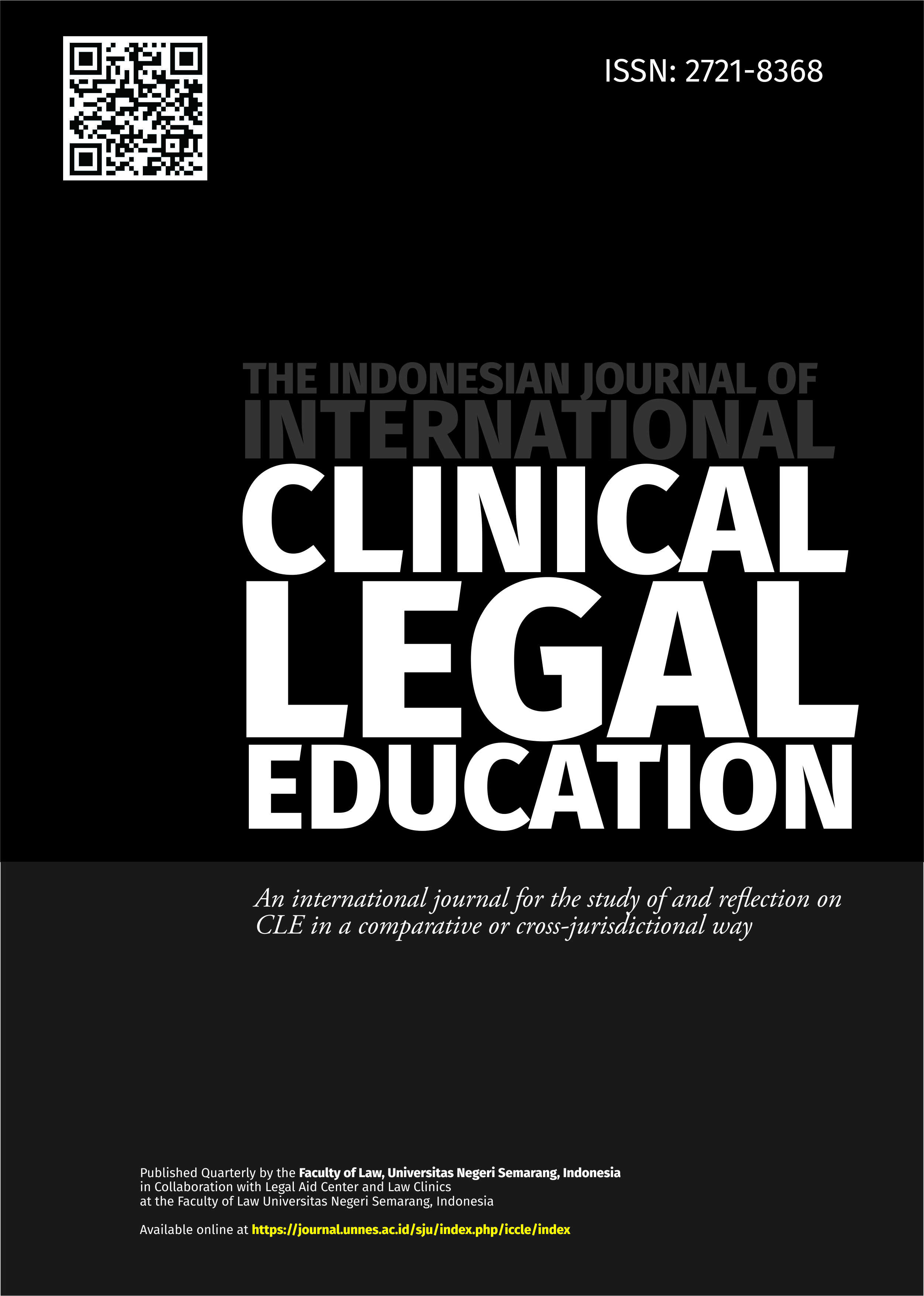Implementation of Legal Aid to Debtors Due to Arrears in Motor Vehicle Installments Executed by Debt Collectors as Impact of the Covid-19 Pandemic
Main Article Content
Abstract
Based on Law No. 16 of 2011 on Legal Aid, Article 1 paragraph (1) states that Legal Aid is a legal service provided by legal aid providers free of charge to Legal Aid Recipients. Legal aid is a guarantee of legal protection and a guarantee of equality before the law, which is a constitutional right for every citizen. Because, the constitution guarantees the right of every citizen to get equal treatment before the law, including the right to access justice through legal aid. Due to the Covid-19 pandemic, many people are asking for legal assistance related to the case of installment billing by debt collectors. The debt collector itself is a third party, which has an agreement with the financing institution to make efforts to force the collection of debtor vehicles because it has not paid installments as agreed. The result of this paper is that under these circumstances there is another legal remedy, namely restructuring.
Article Details

This work is licensed under a Creative Commons Attribution-ShareAlike 4.0 International License.
The copyrights of the article in Indonesian J. Int'l Clinical Leg. Educ. is on the Author(s), however, before publishing, it is required to obtain written confirmation from Author(s) in order to ensure the originality (Author Statement of Originality). The statement is to be signed by at least one of the authors who have obtained the assent of the co-author(s) where applicable. This work licensed under a Creative Commons Attribution-ShareAlike 4.0 International (CC BY-SA 4.0). All writings published in this journal are personal views of the authors and do not represent the views of this journal and the author's affiliated institutions.
References
Albanjari, F. R., Prihatin, R., & Suprianto, S. (2021). Analisa Dampak Kebijakan Pemerintah Terhadap Kinerja Keuangan Bank Umum Syariah di Indonesia Pada Era Pandemi Corona Virus Disease-19. Musyarakah: Journal of Islamic Economic (MJSE), 1(1), 9-19.
Aminah, A. (2020). Pengaruh Pandemi Covid 19 Pada Pelaksanaan Perjanjian. Diponegoro Private Law Review, 7(1), 10-16.
Atikah, I. (2018). Perusahaan Leasing dan Debt Collector Dalam Penagihan Kredit Macet Kendaraan Debitur. ADALAH, 2(8).
Bakarbessy, L., & Anand, G. (2018). Buku Ajar Perikatan. Sidoarjo: Zifatama Jawara.
Handayani, I. (2021). Pandemi Covid-19, Masyarakat Banyak Minta Bantuan Hukum Soal Debt Collector. https://www.beritasatu.com/nasional/733275/pandemi-covid19-masyarakat-banyak-minta-bantuan-hukum-soal-debt-collector di akses pada Senin, 15 Februari 2021.
Handayani, P., & Asmara, T. (2019). Pertanggungjawaban Pidana Debt Collector Yang Melakukan Tindak Pidana Perampasan Dalam Kredit Bermasalah. Hukum Responsif, 10(2).
Hardiansyah, H. (2021). Perlindungan Hukum Terhadap Debitur Yang Kesulitan Untuk Memenuhi Kewajiban dalam Perjanjian Kredit Akibat Pandemi Covid-19. Dinamika: Jurnal Ilmiah Ilmu Hukum, 27(3), 430-445.
Junaedi, U. A. (2020). Analysis of Covid-19 Impact for Law and Society. The Indonesian Journal of International Clinical Legal Education, 2(3), 219-234. https://doi.org/10.15294/ijicle.v2i3.38330
Kumala, R. D. M. (2020). Legal Analysis of Government Policy on Large Scale Social Restrictions in Handling Covid-19. The Indonesian Journal of International Clinical Legal Education, 2(2), 181-200.
Lincolin, A. (2004). Ekonomi Pembangunan. Yogyakarta: STIE YKPN.
Mufida, S., Timur, F. C., & Waluyo, S. D. (2020). Strategi Pemerintah Indonesia Dalam Menangani Wabah Covid-19 dari Perspektif Ekonomi. Independen, 1(2), 121-130.
Muhammad, A. (2010). Hukum Perusahaan Indonesia. cet. ke-4 revisi. Bandung: PT. Citra Aditya Bakti.
Munandar, M. H. (2020). Analysis the effectiveness of tax relaxation due to Covid-19 pandemy on Indonesian economic defense. Lex Scientia Law Review, 4(1), 125-133.
Nugrahaningsih, W., & Utami, I. W. (2021). Perlindungan Bagi Debitur Penerima Fasilitas Kredit Dimasa Pandemi Covid 19. Jurnal Indonesia Sosial Sains, 2(3), 484-493.
Philipus M. Hadjon. (1987). Perlindungan Bagi Rakyat Di Indonesia, Surabaya: Bina Ilmu.
Pramesti, T. J. A. (2020). Panduan Hukum Menghadapi Debt Collectors, https://www.hukumonline.com/klinik/detail/ulasan/lt4d9d52b6c5d33/panduan-hukum-menghadapi-idebt-collector-i diakses pada 17 September 2021
Putra, A., & Saraswati, D. (2020). Bank dan Lembaga Keuangan Lainnya. Surabaya: CV. Jakad Media Publishing.
Rosita, R. (2020). Pengaruh pandemi Covid-19 terhadap UMKM di Indonesia. Jurnal Lentera Bisnis, 9(2), 109-120.
Salters, S. (2021). Debt-Collection Reforms Draw Congressional Focus Post-COVID. American Bankruptcy Institute Journal, 40(7), 8-55.
Sina, P. G. (2020). Ekonomi Rumah Tangga Di Era Pandemi Covid-19. Journal of Management: Small and Medium Enterprises (SMEs), 12(2), 239-254.
Sukerta, I. M. R., Budiartha, I. N. P., & Arini, D. G. D. (2021). Restrukturisasi Kredit terhadap Debitur Akibat Wanprestasi Karena Dampak Pandemi Covid-19. Jurnal Preferensi Hukum, 2(2), 326-331.
Usanti, T. P., & Shomad, A. (2017). Hukum Perbankan. Jakarta: Kencana.
[…] http.blogspot.com/2011/05/Analisis-penggunaan-Debt-Collector.html) diakses pada tanggal 6 Desember 2018, pukul.15.00 WIB.
Laws and Regulations
Undang – Undang Dasar Negara Republik Indonesia Tahun 1945
POJK (Peraturan Otoritas Jasa Keuangan) Nomor 11/POJK.03/2015 tentang Ketentuan Kehati-Hatian Dalam Rangka Stimulus Perekonomian Nasional Bagi Bank Umum
Kitab Undang – Undang Hukum Pidana
Surat Edaran Bank Indonesia No.7/60/DASP Tahun 2005
